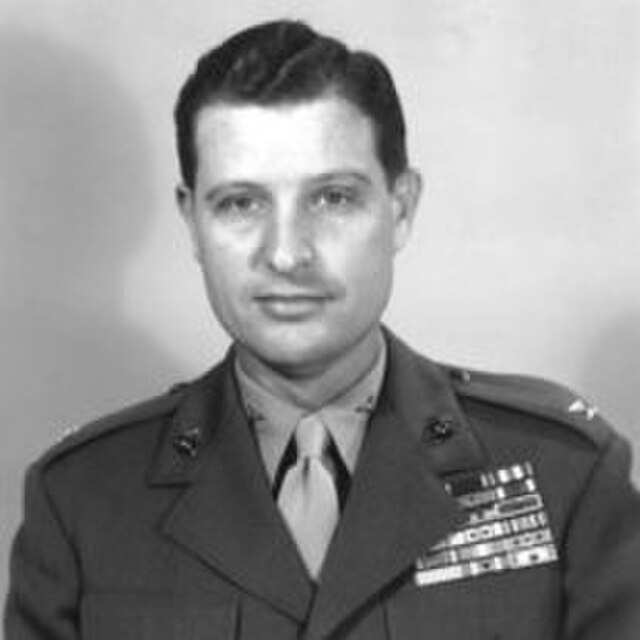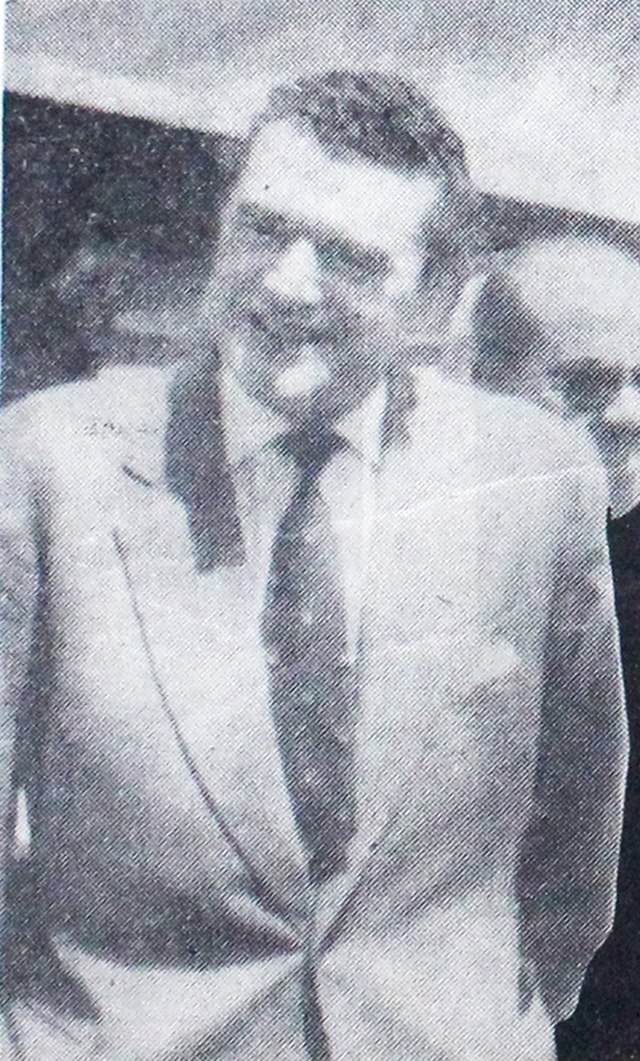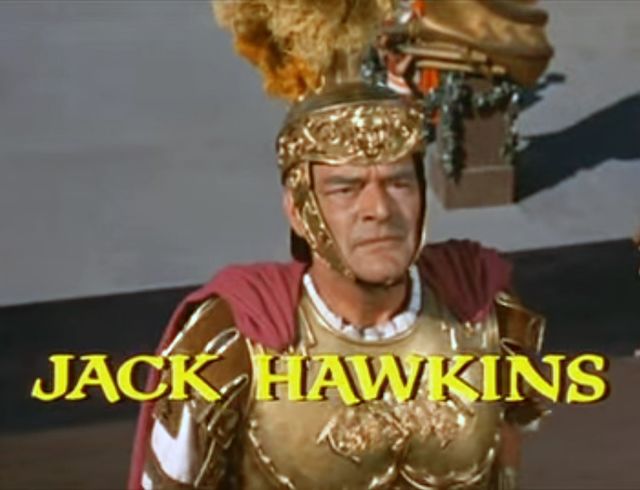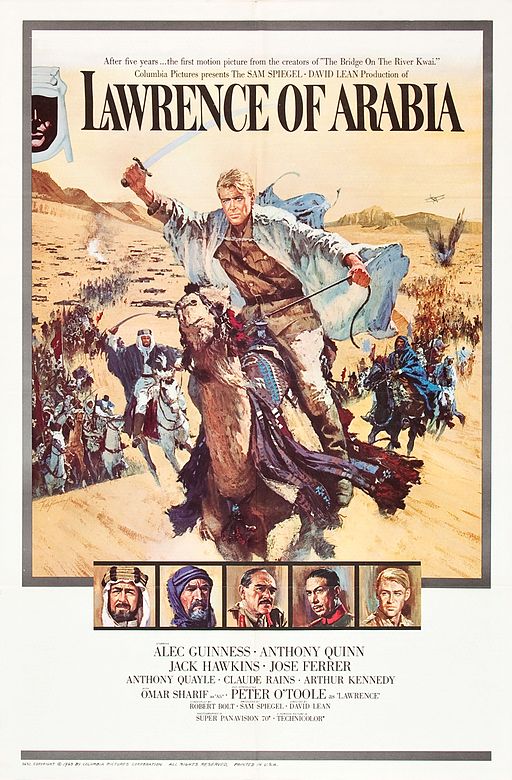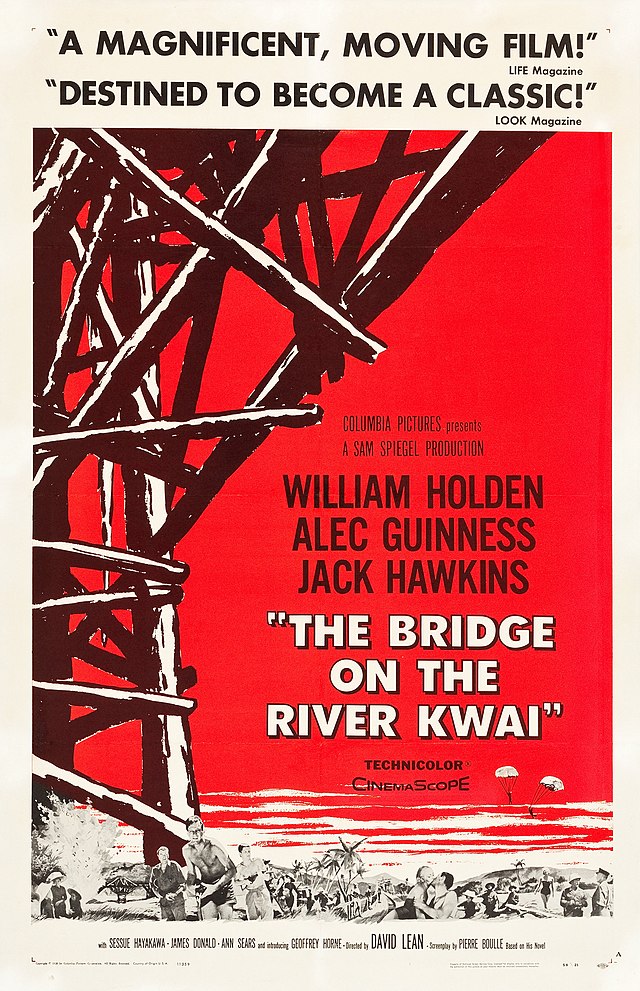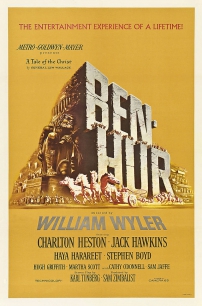Jack Hawkins
back| Full Name | John Edward Hawkins |
| Stage Name | Jack Hawkins |
| Born | September 14, 1910 |
| Birthplace | Wood Green, London, England |
| Died | July 18, 1973 |
| Buried | Golders Green Crematorium, London, England (ashes were scattered in the Garden of Remembrance) |
| Married to | Jessica Tandy (1932–1940, divorced) - Doreen Lawrence (1947–1973, until his death) |
| Children | Susan Hawkins (daughter, with Jessica Tandy) - Nicholas Hawkins (son, with Doreen Lawrence) - Caroline Hawkins (daughter, with Doreen Lawrence) - Andrew Hawkins (son, with Doreen Lawrence) |
| Notable films | The Cruel Sea (1953) - Ben-Hur (1959) - The Bridge on the River Kwai (1957) - Zulu (1964) - The League of Gentlemen (1960) |
Jack Hawkins
The Quintessential British Officer
Jack Hawkins (1910-1973) was a distinguished British actor known for his commanding presence and authoritative roles in war films and historical dramas. Born in London, he began acting on stage at age 12 and transitioned to film in the 1930s.
Known for his deep voice and dignified characters, he continued to act even after losing his voice to cancer in 1966. Appointed CBE in 1958, Hawkins left a lasting legacy as one of Britain's most respected actors. He passed away in 1973, leaving behind a body of work that remains influential.
Related
Jack Hawkins (1910 – 1973)
Biography and Movie Career
John Edward Hawkins, known professionally as Jack Hawkins, was born on September 14, 1910, in Wood Green, London. From a young age, he demonstrated a passion for acting, making his stage debut at the tender age of 12. He was educated at Wood Green’s Tollington School, where he continued to cultivate his interest in theater.
Career Beginnings
Hawkins began his professional career on the London stage, where he quickly made a name for himself as a talented and versatile actor. His early work included appearances in various stage productions and radio plays. However, his film career took off in the 1930s, where he started to gain recognition in British cinema.
World War II
During World War II, Hawkins served with the Royal Welch Fusiliers, where he reached the rank of colonel. His military experience would later influence many of his most famous film roles, where he often portrayed strong, authoritative figures.
Rise to Stardom
After the war, Hawkins' film career flourished. He became particularly known for his roles in war films and historical epics. His portrayal of Commander Ericson in "The Cruel Sea" (1953) was a breakthrough role that solidified his reputation as a leading man in British cinema.
He is perhaps best known internationally for his roles in "The Bridge on the River Kwai" (1957), where he played Major Warden, and "Lawrence of Arabia" (1962), in which he portrayed General Allenby. Both films were critically acclaimed and are considered classics of world cinema.
Later Career and Health Issues
In the late 1960s, Hawkins’ career was impacted by serious health issues. He was diagnosed with throat cancer in 1965, which eventually led to the removal of his larynx in 1966. Despite the loss of his natural voice, Hawkins continued to work, often having his voice dubbed by other actors.
His final films included "Waterloo" (1970), "Young Winston" (1972), and "Theatre of Blood" (1973), where his strong screen presence remained undiminished even as his health deteriorated.
Death and Legacy
Jack Hawkins passed away on July 18, 1973, from complications related to his cancer treatment. His ashes were scattered in the Garden of Remembrance at Golders Green Crematorium in London.
Hawkins left behind a legacy as one of the most distinguished actors of his generation. He was remembered for his distinctive on-screen authority, and his performances in some of the most iconic films of the 1950s and 1960s continue to be celebrated.
Why Jack Hawkins could not Speak in his Final Years:
Jack Hawkins’ Commanding Acting Style
Jack Hawkins was a quintessential figure of British cinema, known for his commanding presence, gravitas, and the quiet strength that he brought to his roles. His acting style was characterized by an understated yet powerful intensity, which made him the go-to actor for roles that required a mix of authority, dignity, and inner resolve.
Commanding Presence
Hawkins had a natural air of authority that was palpable on screen. This was not just due to his tall, imposing figure or his deep, resonant voice, but also because of the way he carried himself. Whether playing a military officer, a historical leader, or a man of high social standing, Hawkins embodied leadership. His characters often exuded a sense of duty and responsibility, which he conveyed through his deliberate movements and measured speech. He didn't need to resort to overt displays of emotion; instead, he communicated volumes through a simple glance, a firm posture, or a controlled tone.
Subtlety and Restraint
Hawkins was a master of subtlety. He had an ability to convey complex emotions with minimal effort, often relying on small, nuanced gestures rather than broad expressions. This restraint made his performances feel authentic and grounded, drawing viewers into the internal struggles of his characters. In scenes of intense drama or conflict, Hawkins would often let silence do the talking, using pauses and stillness to build tension and convey the gravity of a situation.
Dignity and Nobility
Dignity was a hallmark of Hawkins' performances. He often played characters who were honorable, principled, and resolute, whether they were naval officers, judges, or political leaders. This sense of nobility was not just a reflection of the roles he chose, but also of his approach to acting. Hawkins imbued his characters with a moral fortitude that made them admirable, even in their flaws. He had a way of portraying the burden of leadership, showing how his characters wrestled with difficult decisions while maintaining their composure and sense of duty.
Emotional Depth
While Hawkins was known for his restraint, this did not mean his performances lacked emotional depth. On the contrary, his ability to convey deep emotion through subtle means was one of his greatest strengths. In films like "The Cruel Sea" and "The Bridge on the River Kwai," Hawkins portrayed men who were hardened by war, yet deeply affected by the toll it took on them and those under their command. He could express sorrow, regret, or pride with a simple change in his expression or tone, making his characters complex and multi-dimensional.
Versatility within Typecasting
Although often typecast as authority figures, Hawkins demonstrated a range of abilities within this typecasting. He could play the stern but fair military commander, the compassionate teacher, the conflicted leader, or the weary veteran with equal skill. This versatility was evident in his ability to switch between roles that required him to be both authoritative and vulnerable, sometimes within the same film. Even when playing similar characters, Hawkins managed to bring something new to each role, whether it was a different aspect of leadership or a new way of coping with adversity.
Voice as an Instrument
Hawkins’ voice was one of his most powerful tools. Deep, resonant, and commanding, it was perfect for delivering speeches, orders, and declarations with authority. However, Hawkins also knew how to modulate his voice to suit the needs of a scene. He could soften it to express empathy or sorrow, or harden it to convey resolve or anger. Even after losing his voice to throat cancer, Hawkins continued to act, with his voice often dubbed by other actors. Despite this, his physical presence and the strength of his performances continued to convey the same authority and emotional depth that his voice had always supported.
Legacy of the "Quiet Hero"
Hawkins' acting style has left a lasting impact on British cinema. He epitomized the "quiet hero" archetype — characters who are strong, principled, and often silently suffering under the weight of their responsibilities. His performances were never showy or ostentatious; instead, they were grounded, realistic, and profoundly human. Hawkins made it clear that true strength comes from within, and his characters often found their greatest power in their ability to endure and to lead with integrity. This legacy of quiet strength and dignity continues to influence actors who take on roles that require a balance of authority and humanity.
Jack Hawkins as Voice Character:
Jack Hawkins was best known for his on-screen roles, but he did lend his distinctive voice to a few significant projects, especially in narration roles. His voice, deep and authoritative, was well-suited for documentary and voice-over work, adding gravitas and impact to the projects he was involved with. Below are some notable instances where Hawkins provided his voice:
Notable Voice Roles:
"The Conquest of Everest" (1953)
Role: Narrator
Overview: Hawkins provided the narration for this British documentary film that chronicled the successful 1953 British expedition to Mount Everest, led by Sir John Hunt. The documentary covers the historic climb by Sir Edmund Hillary and Tenzing Norgay. Hawkins' voice added a solemn and inspirational tone to the film, which was well-received and enhanced the documentary's dramatic impact.
"Land of the Pharaohs" (1955)
Role: Pharaoh Khufu
Overview: While Jack Hawkins starred as the Pharaoh Khufu in this historical epic, his deep voice was crucial in delivering the powerful speeches and commands of the ruler. His voice lent the character an imposing and regal presence, fitting for the grandiose setting of ancient Egypt.
Documentary Narrations (Various)
Throughout his career, Hawkins' voice was used for various British documentaries, especially those related to military history and significant historical events. His voice was seen as a natural fit for projects requiring a tone of seriousness and authority.
Post-1966 Dubbed Roles:
After Hawkins lost his voice to throat cancer in 1966, his film roles continued, but his voice was dubbed by other actors. Some notable examples include:
"Waterloo" (1970)
Dubbed by: Charles Gray
Overview: In this historical drama, Hawkins played General Sir Thomas Picton. Although his performance remained physically strong, Charles Gray provided the voice, trying to match Hawkins' authoritative tone.
"Theatre of Blood" (1973)
Dubbed by: Valentine Dyall
Overview: In this horror-comedy, Hawkins played a theater critic. Valentine Dyall’s deep voice was used to match Hawkins’ original vocal style.
"Oh! What a Lovely War" (1969)
Dubbed by: Charles Gray
Overview: Hawkins played Emperor Franz Joseph I of Austria, with his voice again dubbed by Charles Gray to retain the regal and commanding tone associated with his roles.
Memorable Quotes by Jack Hawkins
On his career choices:
“I always considered it a privilege to be able to do what I did, to have been involved in films that told stories that needed to be told.”
On the craft of acting:
“Acting is not about being someone different. It’s finding the similarity in what is apparently different, then finding myself in there.”
On his voice and acting:
“The voice is an actor’s instrument, and it’s like playing a violin. You need to use it properly to create the right tone and emotion. I always took great care with how I delivered my lines.”
Reflecting on typecasting:
“I played a lot of military men because, after the war, there was a demand for that sort of character. But I always tried to bring out the humanity in those roles, to show that leadership is as much about heart as it is about command.”
On his battle with throat cancer:
“Losing my voice was a severe blow, but it didn’t silence me. I continued to act because I believed I still had stories to tell, and my presence on screen could still communicate something powerful.”
On his legacy:
“If I am remembered, I hope it is for the quality of the work, the honesty of the performances, and for contributing in some small way to the history of cinema.”
On the importance of film:
“Films have the power to move, to teach, and to inspire. It’s not just entertainment; it’s an art form that can change perspectives and lives.”
What Others Said about Jack Hawkins:
· Richard Attenborough (Actor/Director):
“Jack was the epitome of the English gentleman. He brought a sense of authority and calm to the set, and you knew that whatever role he was playing, it would be delivered with absolute conviction.”
· Alec Guinness (Actor):
“Jack had a presence that few others could match. His performances were always measured and powerful, with a depth that came from a true understanding of the characters he played.”
· Peter O'Toole (Actor):
“Working with Jack on ‘Lawrence of Arabia’ was an education in itself. He was meticulous, always prepared, and had an innate ability to bring out the best in those around him.”
· David Lean (Director):
“Hawkins was one of those actors who made directing easier. He understood the material, respected the process, and always delivered more than you expected.”
· Michael Caine (Actor):
“In ‘Zulu,’ Jack was the anchor. His portrayal of an officer under siege was so convincing that you couldn’t help but be drawn into the story. He had that rare ability to make everything around him seem real.”
· Kenneth More (Actor):
“Jack was a true professional, a man of great talent and even greater humility. He never sought the limelight, but his performances always shone brightly. There was a quiet intensity to him that made his characters unforgettable.”
· Bosley Crowther (Film Critic, The New York Times):
“Jack Hawkins had an extraordinary gift for playing men of integrity, with a stoicism that was compelling without ever being cold. His presence on screen was reassuring, like watching a master at work.”
· John Mills (Actor):
“Jack brought a sense of dignity to his roles that few could replicate. He was a leader both on and off the screen, a man who commanded respect without ever demanding it.”
· Basil Dearden (Director):
“Hawkins was the kind of actor who made everything seem effortless. He was always in control, never overplaying a scene, and yet his performances were full of emotion and depth.”
· Margaret Rutherford (Actress):
“Jack was a gentle giant in our industry. He had a heart as big as his talent, and his work continues to inspire those who aspire to true excellence in acting.”
Awards and Recognition:
BAFTA Awards
Nominated:
1954 - Best British Actor for "The Cruel Sea": Jack Hawkins received a nomination for his powerful portrayal of Captain Ericson in this wartime drama. The role was one of his most celebrated and brought him considerable acclaim.
Cannes Film Festival
Won:
1953 - Best Actor, National Board of Review (USA) for "The Cruel Sea": Although not an official Cannes award, this recognition came in the context of the film's international success and was part of the broader acclaim Hawkins received for his role.
National Board of Review (USA)
Won:
1953 - Best Actor for "The Cruel Sea": This American award recognized Hawkins' standout performance in the film that became a defining role in his career.
Laurel Awards
Nominated:
1959 - Top Male Supporting Performance for "Ben-Hur": Hawkins received a nomination for his supporting role as Quintus Arrius in the epic historical drama Ben-Hur.
Honorary Recognitions
- Commander of the Order of the British Empire (CBE): In 1958, Jack Hawkins was appointed a Commander of the Order of the British Empire (CBE) for his services to drama. This was a significant recognition of his contributions to British cinema and his status as one of the leading actors of his time.
Movies featuring Jack Hawkins:
1930s
- "Birds of Prey" (1930)
Synopsis: Jack Hawkins' film debut, this early British drama centers around a government agent tasked with uncovering a plot to overthrow the government. - "The Broken Rosary" (1934)
Synopsis: A mystery drama in which Hawkins plays a small role in the story of a man who is wrongly accused of a crime and must clear his name. - "Autumn Crocus" (1934)
Synopsis: A romantic drama about a schoolteacher who falls in love with an innkeeper during a holiday in the Alps, only to discover he is already married. - "Peg of Old Drury" (1935)
Synopsis: A historical drama based on the life of the famous 18th-century actress Peg Woffington, with Hawkins in a supporting role. - "Beauty and the Barge" (1937)
Synopsis: A comedy about a beautiful young woman who finds herself aboard a barge with a group of eccentric characters. - "The Frog" (1937)
Synopsis: A crime thriller where Hawkins plays a supporting role in the story of a master criminal known as "The Frog," who is pursued by Scotland Yard. - "Murder Will Out" (1939)
Synopsis: A crime mystery in which Hawkins plays a detective investigating a series of murders in a small town.
1940s
- "The Flying Squad" (1940)
Synopsis: A crime drama featuring Hawkins as a detective on the trail of a smuggling ring. - "Partners in Crime" (1942)
Synopsis: A wartime thriller about a group of British agents working behind enemy lines in Nazi-occupied Europe. - "The Next of Kin" (1942)
Synopsis: A wartime propaganda film that warns of the dangers of careless talk, focusing on how small pieces of information can be used by the enemy. - "The Fallen Idol" (1948)
Synopsis: Hawkins has a small but important role in this story about a young boy who idolizes his family’s butler, only to become embroiled in a murder investigation. - "The Small Back Room" (1949)
Synopsis: A post-war drama about a troubled bomb disposal expert working through personal and professional challenges.
1950s
- "State Secret" (1950)
Synopsis: A political thriller where Hawkins plays a doctor who accidentally uncovers a dangerous secret in a totalitarian state. - "The Black Rose" (1950)
Synopsis: An adventure film set in the 13th century, where Hawkins plays a supporting role as a knight who joins a young man on a journey to China. - "Mandy" (1952)
Synopsis: A drama about a deaf girl and her family's efforts to give her a normal life. Hawkins plays a compassionate headmaster at the school for the deaf. - "The Planter's Wife" (1952)
Synopsis: A drama set during the Malayan Emergency, where Hawkins plays a rubber plantation owner whose wife becomes the target of communist guerrillas. - "Angels One Five" (1952)
Synopsis: A war film set during the Battle of Britain, where Hawkins plays the commanding officer of a RAF fighter squadron. - "The Cruel Sea" (1953)
Synopsis: A war film that tells the story of the crew of a British convoy escort ship during World War II, with Hawkins in the role of the ship's determined and stoic captain. - "Malta Story" (1953)
Synopsis: A war film about the defense of Malta during World War II, with Hawkins playing a key role as an intelligence officer coordinating the island's defense. - "Twice Upon a Time" (1953)
Synopsis: A light-hearted romantic comedy about a couple who meet again after many years and rekindle their relationship, with Hawkins playing the male lead. - "The Intruder" (1953)
Synopsis: A crime drama where Hawkins plays a former detective who investigates a murder to clear his friend’s name. - "The Seekers" (1954)
Synopsis: An adventure film set in New Zealand, where Hawkins plays a man searching for a new life in the newly settled land. - "Land of the Pharaohs" (1955)
Synopsis: A historical epic where Hawkins plays the role of a pharaoh who builds a grand pyramid to ensure his legacy. - "The Long Arm" (1956)
Synopsis: A crime thriller about a Scotland Yard detective (played by Hawkins) who investigates a series of safe robberies across London. - "The Bridge on the River Kwai" (1957)
Synopsis: A war epic set in a Japanese POW camp where Hawkins plays Major Warden, who leads a mission to destroy the bridge being built by the prisoners. - "Fortune Is a Woman" (1957)
Synopsis: A crime drama about an insurance investigator (Hawkins) who uncovers fraud but becomes romantically involved with the suspect. - "The Two-Headed Spy" (1958)
Synopsis: A wartime spy thriller where Hawkins plays a British double agent working within the Nazi hierarchy during World War II. - "Ben-Hur" (1959)
Synopsis: An epic historical drama in which Hawkins has a small but pivotal role as Quintus Arrius, a Roman commander who becomes a mentor to the protagonist. - "The League of Gentlemen" (1960)
Synopsis: A heist film where Hawkins plays a disgruntled former army officer who recruits a group of ex-servicemen to carry out a daring robbery.
1960s
- "A Terrible Beauty" (1960)
Synopsis: A war drama set during the Irish War of Independence, with Hawkins playing an IRA leader who becomes disillusioned with the violent struggle. - "The Siege of Sidney Street" (1960)
Synopsis: A historical crime drama based on the real-life 1911 siege, where Hawkins plays a police chief tasked with capturing a gang of Latvian anarchists. - "Five Finger Exercise" (1962)
Synopsis: A family drama about the tensions that arise when a tutor enters the life of a troubled English family, with Hawkins playing the patriarch. - "Lawrence of Arabia" (1962)
Synopsis: A historical epic about T.E. Lawrence, with Hawkins playing General Allenby, who guides and supports Lawrence's campaign in the Arabian desert. - "Guns at Batasi" (1964)
Synopsis: A military drama set in Africa during the decolonization period, where Hawkins plays a British sergeant major who must maintain order during a mutiny. - "Zulu" (1964)
Synopsis: A war film depicting the Battle of Rorke's Drift, with Hawkins playing a role as the stern and experienced officer overseeing the defense. - "Lord Jim" (1965)
Synopsis: An adventure drama based on Joseph Conrad's novel, where Hawkins plays a key role in the story of a disgraced British naval officer seeking redemption. - "The Third Secret" (1965)
Synopsis: A psychological thriller where Hawkins plays a television commentator who gets entangled in the mystery surrounding a psychologist's death. - "Masquerade" (1965)
Synopsis: A comedy-thriller about a plot to kidnap a Middle Eastern prince, with Hawkins playing an English colonel who gets involved in the scheme. - "Judith" (1966)
Synopsis: A wartime drama set in British Mandate Palestine, where Hawkins plays a British officer trying to protect a Jewish woman from her Nazi husband. - "Shalako" (1968)
Synopsis: A Western where Hawkins plays a European aristocrat who, along with other European tourists, is saved by an American cowboy from an Apache attack. - "The Magus" (1968)
Synopsis: A mystery drama based on John Fowles' novel, where Hawkins plays a retired British colonel living on a Greek island, who becomes part of a psychological game. - "Waterloo" (1970)
Synopsis: A historical war film depicting the Battle of Waterloo, where Hawkins plays a supporting role as the Duke of Wellington's aide-de-camp. - "The Adventures of Gerard" (1970)
Synopsis: A comedic adventure film set during the Napoleonic Wars, with Hawkins playing a British officer who crosses paths with the titular hero. - "Oh! What a Lovely War" (1969)
Synopsis: A satirical war film that presents World War I through the lens of a musical, with Hawkins playing the role of Emperor Franz Joseph. - "When Eight Bells Toll" (1971)
Synopsis: A spy thriller where Hawkins plays a naval officer assisting a British agent in investigating a series of hijackings off the Scottish coast. - "Young Winston" (1972)
Synopsis: A biographical drama about the early life of Winston Churchill, with Hawkins playing a supporting role as a British military officer. - "Nicholas and Alexandra" (1971)
Synopsis: A historical drama about the last days of Tsar Nicholas II, with Hawkins playing Count Witte, a Russian statesman advising the Tsar. - "Theatre of Blood" (1973)
Synopsis: A horror-comedy where Hawkins plays a theatre critic targeted by a vengeful actor who begins to murder critics based on Shakespearean deaths. - "11 Harrowhouse" (1974)
Synopsis: A heist comedy-thriller about a jewel heist, with Hawkins playing the chairman of the board at the London Diamond Corporation, one of his final roles.
Notable Unreleased or Uncredited Roles
- "Cars That Ate Paris" (1974)
Synopsis: A cult Australian film about a small town with a deadly secret, in which Hawkins was involved before his death.

